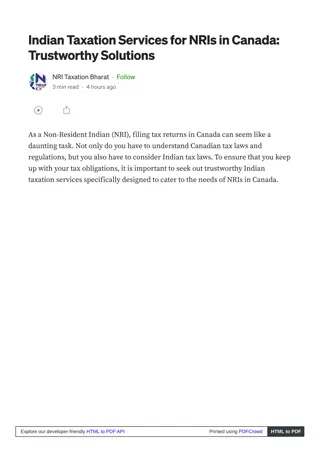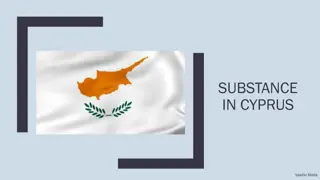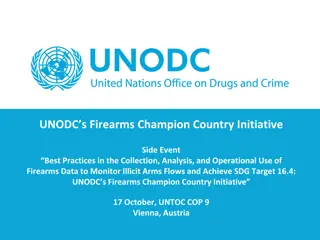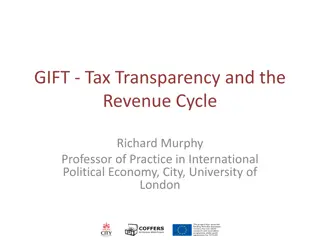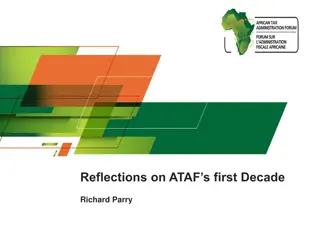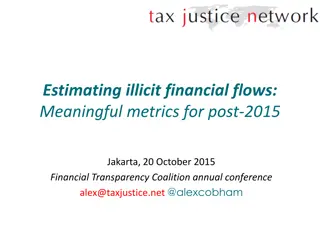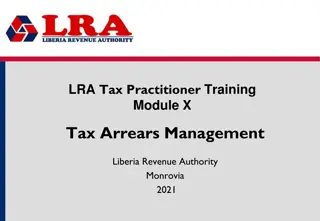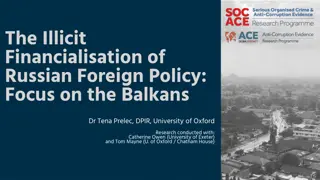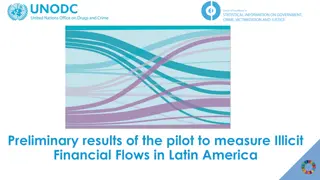Illicit Financial Flows in Relation to Tax
It is crucial to address illicit financial flows related to tax evasion and money laundering for the economic stability of Nigeria. The report highlights the impact of commercial activities, criminal actions, and corruption on the economy and suggests measures to combat these illicit practices.
Download Presentation

Please find below an Image/Link to download the presentation.
The content on the website is provided AS IS for your information and personal use only. It may not be sold, licensed, or shared on other websites without obtaining consent from the author.If you encounter any issues during the download, it is possible that the publisher has removed the file from their server.
You are allowed to download the files provided on this website for personal or commercial use, subject to the condition that they are used lawfully. All files are the property of their respective owners.
The content on the website is provided AS IS for your information and personal use only. It may not be sold, licensed, or shared on other websites without obtaining consent from the author.
E N D
Presentation Transcript
ILLICIT FINANCIAL FLOWS IN RELATION TO TAX PROJECT ILLICIT FINANCIAL FLOWS Brief remarks by the Executive Chairman , Federal Inland Revenue Service Muhammed Nami
Introduction It is a great pleasure to deliver a brief at the presentation of the report on illicit financial flows in relation to tax , I must say that this project holds particular significance for the Federal Inland Revenue Service and the country in general, most especially as we try to key into the antigraft agenda and zero tolerance for illicit financial flows activities in th country by President Muhammadu Buhari. Illicit financial flows through cross border laundering, proceeds of crime, financing of terrorism, the theft of state assets, private sector bribery, state capture and most importantly the abuse of taxation has had so much damage on the economy of Nigeria. 3
According to Report of the High level panel on illicit financial flows from africa by Thabo Mbeki designates components of Tax Crimes and Illicit Financial Flows into Commercial Activities which is estimated at 65% by the report and these are illegal flows from business activities that leads to hiding wealth, evading or aggressively avoiding tax, and dodging customs duties and domestic levies. Criminal activities which constitutes 30% of IFFs and are often driven by criminal activities with the purpose of keeping the transactions from the view of law enforcement agencies or revenue authorities. and finally Corruption which is estimated by the report to constitute 5% of IFFs , these are usually money acquired through bribery and abuse of office by public officials are enormous Contribution to Money Laundering / IFF 5% Information from the diagram is gotten from Report of the High Level Panel on Illicit Financial Flows from Africa by Thabo Mbeki (Pg 26) 30% 65% Commercial Activities Criminal Activities Corruption 4
It is however notable to state for the purpose of this gathering that we have identified as a Service , the nature of tax Fraud , Illicit Financial Flows activities and Tax Crimes in Nigeria which takes the shape of Payments of expatriates staff emoluments and remuneration and failure to declare for personal income tax purposes such emoluments to the relevant tax authorities in Nigeria. Laundering of funds (often sourced illegally) through Real Estates transactions to acquire property in choice locations outside Nigeria. Illegal transfer of money out of Nigeria, via unapproved channels. (Virtual Currencies ) Mispricing of goods and services transferred between interrelated Nigeria based companies (e.g. MNEs) and Individuals to offshore based entities and individuals. Profit Shifting for instance through excessive interest payments on foreign and locally sourced loans. Mis-invoicing of Imports and exports. Hawala etc 5
FIRSs Strategies of curbing Illicit Financial Flows Activities : 1bn Banking Turnover FIRS wrote to all commercial banks in May 2018, requesting for a list of Companies, Partnerships, & Enterprises with N1 Billion banking turnover. 23 BANKS RESPONDED: COMPANIES PARTNERSHIPS AND ENTERPRISE FOUND 18,602 COMPANIES, PARTNERSHIPS, AND ENTERPRISE NOT PAYING TAXES: 6,722 COMPANIES PARTNERSHIPS AND ENTERPRISE PAYING SOME TYPE OF TAXES 11,830 COMPANIES PARTNERSHIPS AND ENTERPRISES TO BE ENFORCED UPON: 4500 AMOUNT RECOVERED FROM DEFAULTING TAYPAYERS AS AT SEP 2019: 37.327 BN 6
FIRSs Strategies of curbing Money Laundering/Terrorism Financing/ Illicit Financial Flows: 100M 999M Banking Turnover 23 BANKS RESPONDED: COMPANIES PARTNERSHIPS AND ENTERPRISE FOUND 18,602 COMPANIES PARTNERSHIPS AND ENTERPRISE PAYING SOME TYPE OF TAXES ABOVE 56 % FULL COMPLIANCE COMPANIES, PARTNERSHIPS, AND ENTERPRISE NOT PAYING FULL TAXES: 45, 283 AMOUNT RECOVERED FROM DEFAULTING TAYPAYERS AS AT SEP 2019: 45, 889 BN COMPANIES PARTNERSHIPS AND ENTERPRISES ENFORCED UPON: 45,283
FIRSs Strategies of curbing Money Laundering / Terrorism Financing /Illicit Financial Flows: Carried out reforms internally to enable us combat the challenges of illicit financial flows activities Signed an MOU /MOA with the Financial Intelligence Unit and designated Authorized Officers for the FIUs Established the first of its kind in africa , a beneficial ownership register for tax purpose with Independent Corrupt Practices Commission and Other Related Offences which has led to so many forfeiture of asset under a presidential directives. A joint task force with the Economic and Financial Crimes Commission which has led to the establishment of a Tax fraud Section Posting of the State Security Services and the Nigeria Police Force to the organization for the purpose of joint intelligence and enforcement of suspects and Tax payers Facilitated and Co sponsored the first conference on Illicit Financial Flows through the Tax for good governance project to create an awareness and bring stakeholders together and a dedicated department on Transfer Pricing and International Taxation 8
FIRSs Strategies of curbing Illicit Financial Flows: Regulations & Exchange of Information Transfer Pricing Regulation: To address tax revenue losses through transfer mispricing of goods and transfer The FIRS have put in place Transfer Pricing regulations in 2012 and established a functional Transfer Pricing Unit focused on ensuring that taxable persons report sales and profits in Nigeria in adherence with globally acceptable standards of arm s length principle for tax purposes. Trend Analysis: FIRS has developed an in-house capability for trend analysis on banking transactions of taxpayers to provide early warning on transactions that might be a potential for Money Laundering and Terrorism Financing /illicit outflow.(Value Chain Analysis) Exchange of Information: Established a functional Exchange of information (EOI) unit in FIRS to oversee an effective system of exchange of tax information with Nigeria tax treaty partners. EOI units also set up at State BIR to ensure a nation-wide framework for effective exchange of information on taxpayers. Base Erosion & Profit Shifting: Nigeria Joined the Inclusive Framework on Base Erosion and Profit Shifting (BEPS) in 2016 and is committed to implementing the minimum standards, as means to improving tax administrative effort to combat erosion of our tax base. Automatic Exchange of information: Nigeria has signed onto the Multilateral Competent Authority Agreement (MCAA) for the Automatic exchange of financial account information with other Countries. This will ensure that Nigeria shall have international support in identifying and tracing funds illegally taken out of Nigeria by Nigeria s Tax residents and invested abroad from which they periodically derive passive incomes (interest, dividends, rent, etc.) from sources outside Nigeria. 9
FIRSs Strategies To Curbing Money Laundering /Terrorism Financing/ Illicit Financial Flows: Collaboration With Other Stakeholders Joint Tax Board: FIRS/JTB integration provides every taxpayer in the country with a once in a life-time harmonized unique tax identification number which makes management of tax affairs across different tax authorities easier. Joint Tax audit by FIRS and SBIRs save compliance cost and time Enhanced collaboration with SBIRs has resulted in the growth of registered taxpayers in Nigeria from 10 million in 2015 to about 19 million in 2018. This growth can curb the easy transfer of unexplained wealth Collaboration with Corporate Affairs Commission (CAC): To this end, any newly registered Company, Partnerships & Enterprise, would automatically get a Tax Identification Number (TIN), which can monitor financial inflow and outflow. Collaboration with Anti-Corruption Agencies: In line with the anticorruption campaign of the Federal government, the Service has established the FIRS/EFCC Information/Regional Meetings on AML-TF (Giaba /FATF) National Risk Assessment and Mutual Evaluations), the Nigeria Customs Service (trade information) and the Nigeria Immigration (information on expatriates emoluments and travel information) to enhance the fight against Tax related economic fraud and Terrorism financing. Joint Tax Force, with NFIU (Financial Global Forum on Transparency and Exchange of Tax Information: In 2011, Nigeria joined the forum and has successfully gone through the Phases 1 and 2 Peer reviews. The peer review process enabled Nigeria develop the administrative structures required to access Tax information offshore, in collaboration with other nations. Signing of Tax treaties - Signed Avoidance of Double Taxation Agreements (ADTAs) with 13 Countries and also signed up to the OECD/EU Mutual Assistance in Tax Matters Convention (MAC) that has over 100 participating Countries 10
Conclusion Unwholesome practices of Multinational Enterprises, Financial Institutions, and Oil and Gas companies remains the biggest component of IFF in Nigeria. Corruption and abuse of office by both political appointees and civil servants thereby enabling Illicit Financial Flows activities offices remain a factor of Money Laundering /Terrorism Financing /IFF / Tax Crimes in Nigeria, and FIRS has ensured collective effort to end this menace. We are striving to reduce the Money Laundering/ Terrorism Financing/ illicit flow of money from Nigeria and effects of beneficial ownership as it is causing economic downturn which has an unprecedented effect on the economy and lives of Nigerians. Stiffer laws and regulation would be enacted to deter future IFF actions by people determined to engage in such acts most especially in the new trend of virtual currencies which is a new typology on illicit financial flows . 13
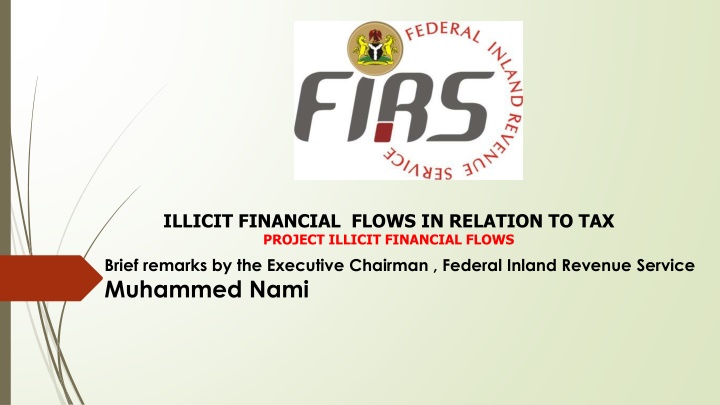


![Town of [Town Name] Real Estate Tax Rates and FY 2024 Budget Summary](/thumb/62211/town-of-town-name-real-estate-tax-rates-and-fy-2024-budget-summary.jpg)

